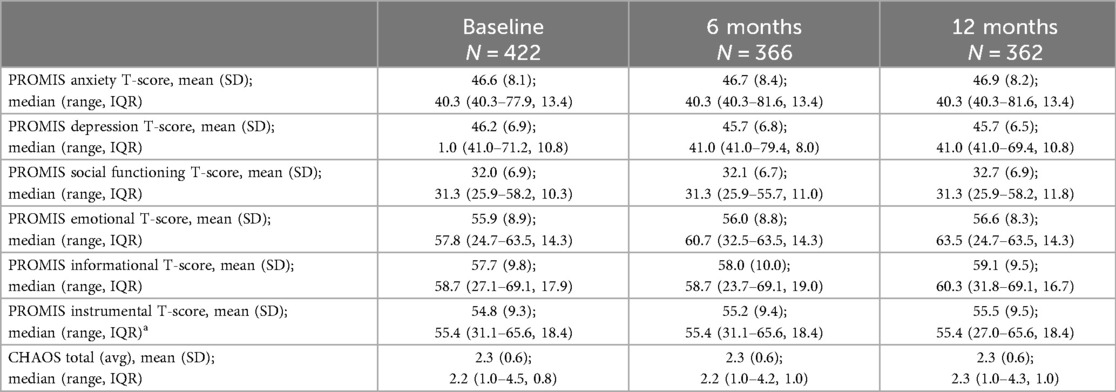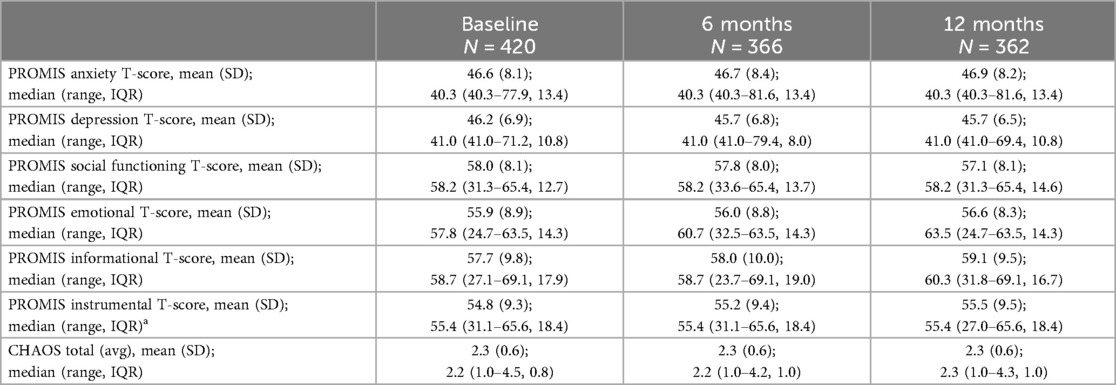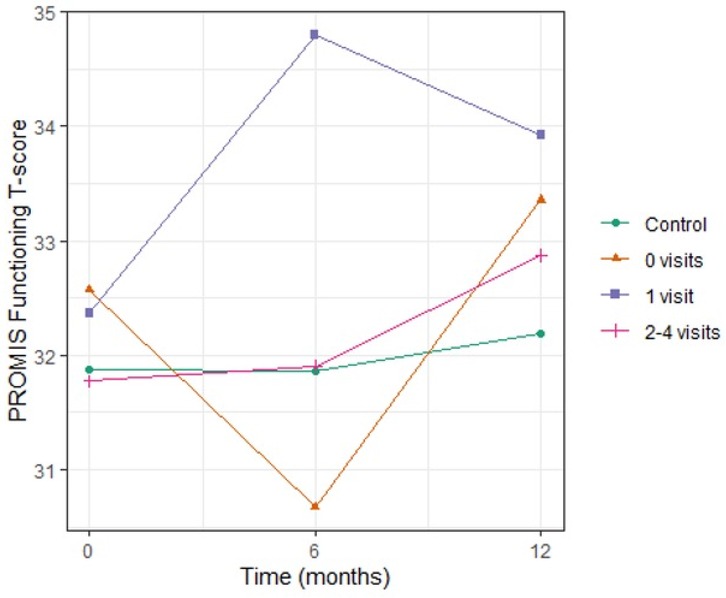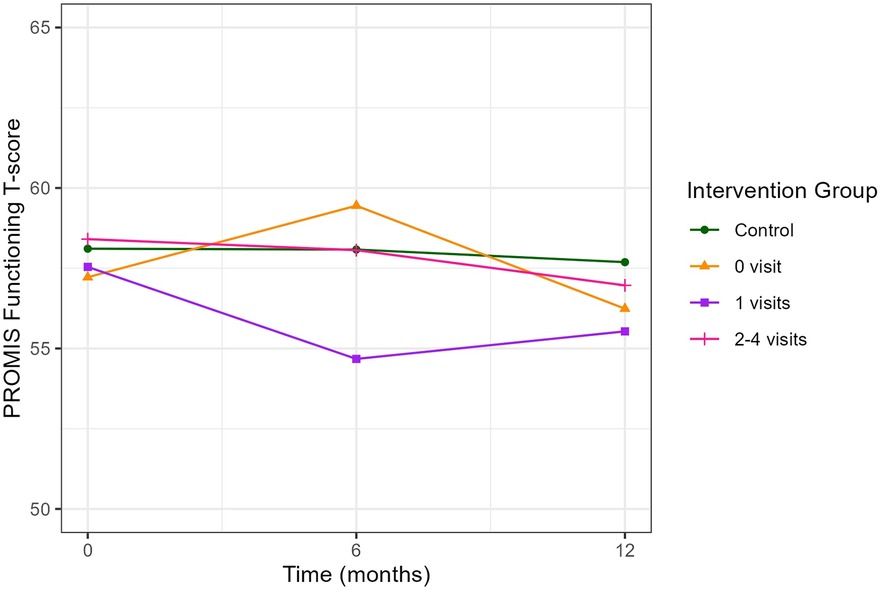- 1Department of Anesthesiology, University of Illinois at Chicago, Chicago, IL, United States
- 2Institute for Health Research and Policy, University of Illinois at Chicago, Chicago, IL, United States
- 3Department of Pediatric Dentistry, University of Illinois at Chicago, Chicago, IL, United States
- 4Department of Pediatrics, University of Illinois at Chicago, Chicago, IL, United States
A Correction on
By Lee HH, Avenetti D, Edomwande Y, Sundararajan V, Cui L, Berbaum M, Nordgren R, Sandoval A and Martin MA (2022). Front. Oral. Health. 3:962849. doi: 10.3389/froh.2022.962849
There is an error in scale calculation regarding the PROMIS Social functioning variable. Recorded scores were incorrectly inverted, resulting in the final calculated scores reflecting the opposite direction of what was intended. When rerun using the correct scoring, the analysis results including this variable did not change. Our corrections are to correct the actual values reported in Table 2 and Figure 3.
There were mistakes in Table 2 as published (inserted below)
Values for the PROMIS Social Functioning T-scores, mean (SD), median (range, IQR) were incorrect, as well as the N for Baseline.
The corrected Table 2 appears below.
There was a mistake in the values for Figure 3 as published.
Values for the Y-axis, “PROMIS Functioning T-score” were incorrect.
The corrected caption of Figure 3 appears below.
Social Functioning scores were incorrectly reported.
A correction has been made to the section: Results, Psychosocial Factors, Paragraph 1. The correct text appears below:
“Psychosocial factor levels did not vary over time (Table 2) or differ by arm. Stress and social support levels were comparable to the general population, (31) except for social functioning. CO-OP caregivers reported social functioning levels slightly above the general population average [58.0 (SD 8.1), 57.8 (8.0), and 57.1 (8.1) at 0, 6, and 12 months respectively; population mean = 50 (SD 10)]. Stratifying social functioning by CHW dose (number of visits) did not reveal a dose effect; participants who had zero (56.2, SD 8.0), one (55.5, SD 7.5), or two to four (57.0, SD 8.7) visits all had similar mean social functioning at 12 months compared to the control group (57.7, SD 8.0) (Figure 3). As there was no variation in psychosocial variables, we did not conduct further analyses”.
The original version of this article has been updated.
Generative AI statement
Any alternative text (alt text) provided alongside figures in this article has been generated by Frontiers with the support of artificial intelligence and reasonable efforts have been made to ensure accuracy, including review by the authors wherever possible. If you identify any issue please contact us.
Publisher's note
All claims expressed in this article are solely those of the authors and do not necessarily represent those of their affiliated organizations, or those of the publisher, the editors and the reviewers. Any product that may be evaluated in this article, or claim that may be made by its manufacturer, is not guaranteed or endorsed by the publisher.
Keywords: community health worker, oral health, psychosocial stress, childhood, parenting
Citation: Lee HH, Avenetti D, Edomwande Y, Sundararajan V, Cui L, Berbaum M, Nordgren R, Sandoval A and Martin MA (2025) Correction: Oral community health worker-led interventions in households with average levels of psychosocial factors. Front. Oral Health 6:1664267. doi: 10.3389/froh.2025.1664267
Received: 11 July 2025; Accepted: 20 October 2025;
Published: 20 November 2025.
Edited and Reviewed by: Keith A. Mays, University of Minnesota, United States
Copyright: © 2025 Lee, Avenetti, Edomwande, Sundararajan, Cui, Berbaum, Nordgren, Sandoval and Martin. This is an open-access article distributed under the terms of the Creative Commons Attribution License (CC BY). The use, distribution or reproduction in other forums is permitted, provided the original author(s) and the copyright owner(s) are credited and that the original publication in this journal is cited, in accordance with accepted academic practice. No use, distribution or reproduction is permitted which does not comply with these terms.
*Correspondence: Helen H. Lee, bGVlaGVsZW5AdWljLmVkdQ==
 Helen H. Lee
Helen H. Lee David Avenetti
David Avenetti Yuwa Edomwande
Yuwa Edomwande Vyshiali Sundararajan
Vyshiali Sundararajan Liyong Cui2
Liyong Cui2 Michael Berbaum
Michael Berbaum Rachel Nordgren
Rachel Nordgren Anna Sandoval
Anna Sandoval Molly A. Martin
Molly A. Martin


